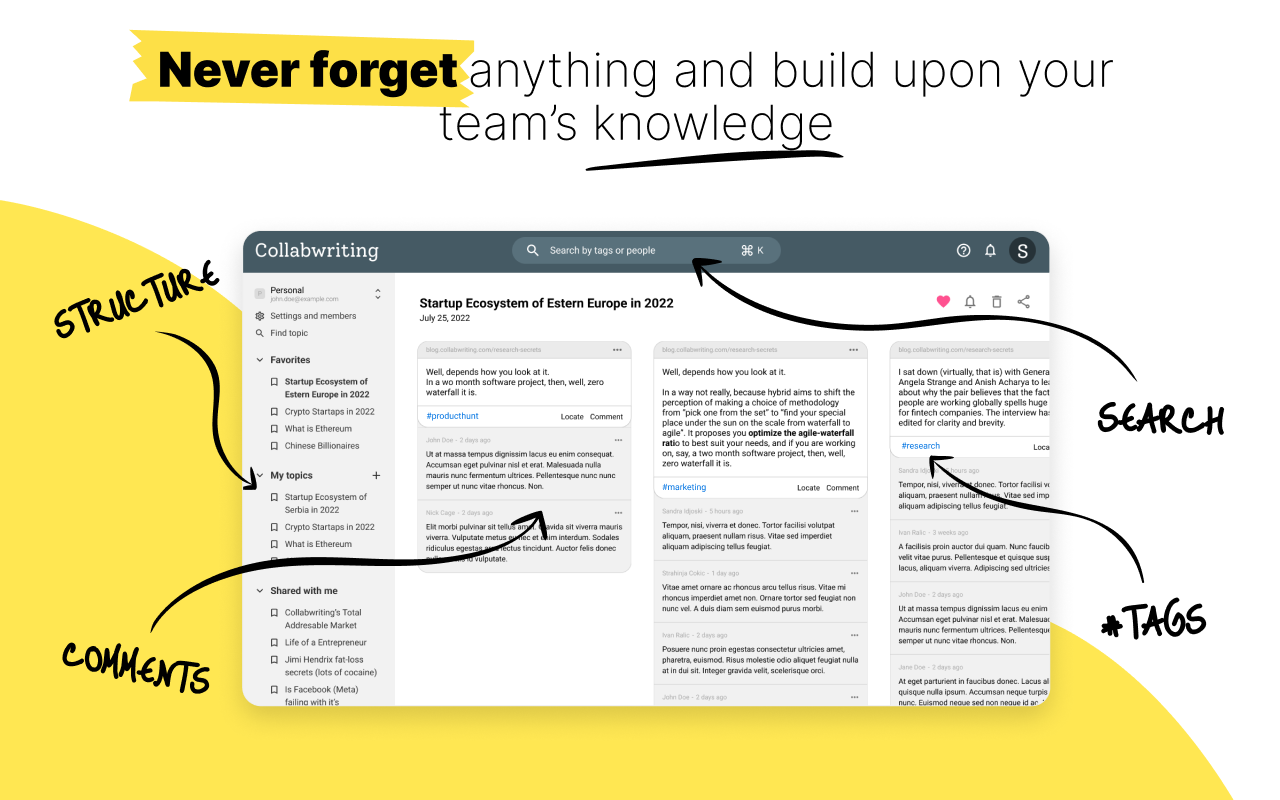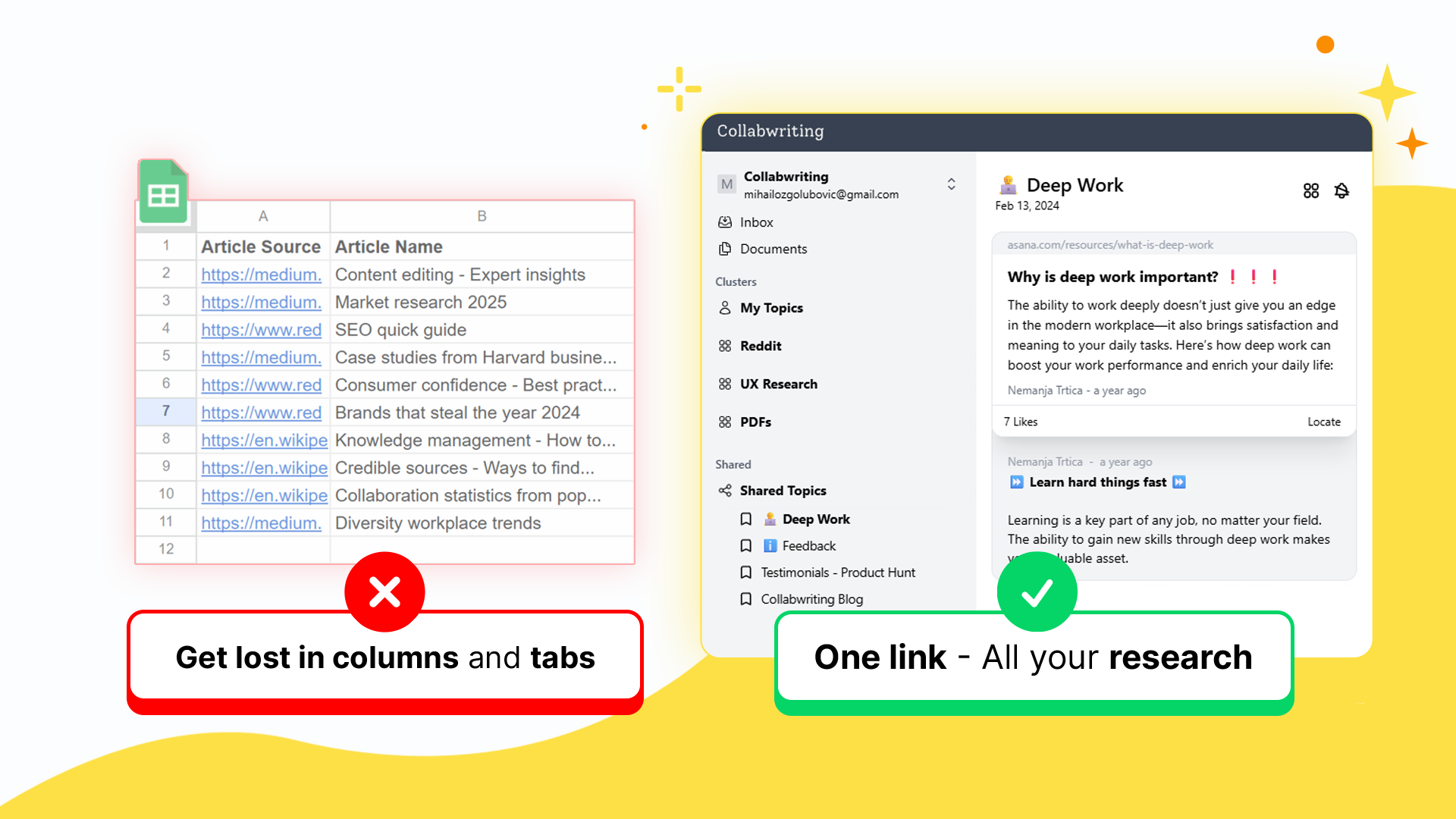Each employee brings their own mix of skills and experience from their education and previous jobs. But every business is unique, and the knowledge it creates is just as unique.
That's why it's so important to have an open and effective culture of sharing knowledge within the company. This way, everyone has the information they need to succeed.
Employees also value this internal knowledge. In a survey, 54% said they found unique company information more important than what they learned elsewhere.
So, creating and maintaining a strong environment for sharing knowledge should be a top priority for any company.
Here’s how to do it properly.
Show people how knowledge sharing benefits them
As a manager or team lead, your main job is to lead by example. When you actively contribute new ideas and insights, your team sees the value of sharing knowledge. This encourages them to rethink their roles and get involved in improving processes and management.
In short, as a leader, you need to demonstrate how valuable their knowledge can be.
Promote collaborative learning
Implement and communicate company policies encouraging employees to share their knowledge.
Highlight that the company values both sharing and learning:
- Employees with helpful knowledge should feel free to share it with others.
- Employees seeking knowledge or experience in a certain area should feel comfortable asking for help.
This approach prevents knowledge hoarding and ensures employees are recognized for sharing their expertise. It also fosters an environment where everyone feels confident reaching out for assistance or learning something new.
Show tips on how to share knowledge
Some people simply love to learn and explore new things. They're also great at sharing what they know. These individuals can inspire others and motivate them to realize they have something valuable to share too.
As a leader, your job is to identify these people and encourage them to advocate for a knowledge-sharing culture.
Role models are essential for any culture, so elevate your experts and give them more opportunities to teach and share their knowledge.

Inspire people to share what they know
Teaching people how to share knowledge and motivating them to do it are two different duties.
When you teach, you show them how to do it. When you motivate, you create a need for them to do it. This need is personal and varies from person to person. Some people will understand the benefits on their own, while others will be driven by the desire to be seen as experts or to receive rewards.
The best reward and recognition system differs from one business to another and depends on your management and strategy.
However, no matter the business, a good system should always reward behaviors that promote sharing and reusing knowledge.
Don't forget about constructive feedback
Getting feedback is important not only with your customers but also with your employees. If you want to build a strong knowledge-sharing culture and a healthy work environment, give your employees a chance to share their feedback.
Even the best teams can have conflicts and friction, especially under stress like approaching deadlines, project issues, or personal problems. These conflicts can escalate and have destructive consequences.
To prevent this, allow your employees to express how they feel about working in the team, what they like, and, most importantly, what they don’t like. Treat your employees with understanding and empathy, just as you would with customers, so they feel safe speaking up.
1. Surveys: Ask employees to rate their experience at the company and suggest improvements.
2. One-on-one meetings: Managers and team leads should regularly check in with team members to see how they are doing.
3. Emails or Suggestion boxes: Provide a way for employees to share their thoughts whenever they feel the need.
Remind employees that mistakes are okay
Many think they must always have the right answers, but this belief can hurt knowledge sharing.
Sharing success stories and best practices boosts company culture, but sharing failures is just as important. Yet, it's only useful if we're open to learning from them. If we only share what works, we stifle creative thinking. What if a great idea arises from a flop?
A culture of knowledge-sharing embraces mistakes. They show effort, even if the solution could be better.
Sharing mistakes helps us learn what to avoid and builds trust and community.
Choose the right tools
Sharing knowledge is about people, not just technology. But the right technology can make a huge difference. In a spread-out dispersed organization, sharing knowledge effectively without the right technology is challenging.
Technology has changed how we communicate and work together. That’s why a company needs to foster a knowledge-sharing culture. However, using the wrong technology can cause problems, from information overload to irrelevant content.
Technology needs to fit how people work, or
it won't help.
To make technology useful, management should pick tools that work for people.

Collabwriting - Shareable Notes on Web Pages
Create shareable notes and highlights on any web page, PDF, YouTube, or Kindle - Organize and collaborate on your research or create a knowledge base.
Create and stick to knowledge-sharing plans
Knowledge sharing can happen naturally, but having a clear plan helps everyone share more effectively. Here's how to get started:
1. Set clear guidelines
Define how your company should create, store, and share knowledge. Specify the formats and resources to use for storing valuable information.
2. Hold Regular meetings
Schedule regular meetings at different levels, from company-wide town halls to project team check-ins. These meetings give everyone a chance to share what they've learned and ask for help.
3. Onboard new employees
Make sure new employees have a smooth start with an onboarding process that includes access to internal knowledge sources and a mentorship program.
4. Build internal resources
Create various internal resources like a knowledge base, professional training sessions, and a knowledge exchange portal. These tools help everyone learn and share information easily.
5. Track and improve
Use a system to measure how well knowledge sharing is working. Track these metrics to see what's effective and where you can improve.
By following these steps, you'll create a welcoming environment where knowledge flows easily and everyone benefits.
How a knowledge-sharing culture can improve your bottom line?
Many benefits knowledge-sharing offers, but let's focus on how a knowledge-sharing culture can improve your bottom line.
1. Efficient knowledge sharing boosts productivity
It's often hard to measure the impact of poor knowledge sharing on productivity and costs.
Most employees say they only need standard information, but studies show 80% are frustrated by the lack of access to former colleagues' knowledge, and 25% feel overwhelmed.
Inefficient knowledge sharing can significantly increase productivity costs.
2. Knowledge sharing boosts employee engagement and retention
Embracing change and new technologies keeps your company competitive. By fostering a knowledge-sharing culture, employees can acquire, assimilate, and transfer knowledge, creating significant value.
A strong learning culture also improves employee engagement and retention. When companies invest in their employees' growth and development through continuous learning opportunities, employees feel valued and appreciated.
3. Ensures knowledge transfer in changing workplaces
In the past, long-term employees shared their knowledge. Today, with multiple generations working together, knowledge isn't always shared effectively.
A strong knowledge-sharing culture ensures successful transfer by engaging both the knowledge source and the receiver.
It's a two-way street: the receiver benefits directly, while the source also sees the value in sharing.
4. Knowledge sharing improves decision-making
According to Gartner, 65% of business decisions are more complex than they were a few years ago. This complexity means there's no room for error, and having a solid knowledge management system is crucial.
A knowledge management system gives everyone access to reliable data, boosts efficiency, and simplifies decision-making. It helps avoid duplicate efforts and ensures decisions are based on the latest information. By using a knowledge management system, you can improve the quality and efficiency of decision-making throughout your organization.
A knowledge management platform helps managers make quicker, better-informed decisions by providing easy access to necessary information from across the company.
5. Knowledge-sharing culture boosts your bottom line
A knowledge-sharing culture positively impacts your bottom line by reducing support costs and improving case resolution times.
By integrating a knowledge management platform, your team can quickly solve cases, saving time and resources.
Instead of hiring additional staff as your company grows, investing in a solution that fosters community problem-solving is a more efficient approach.
To wrap things up
Shared knowledge isn't like a pie that gets smaller when shared; it actually grows.
When you promote a culture of sharing, you're not just spreading knowledge, you're nurturing trust and confidence among your team. This makes work more enjoyable and meaningful for everyone, leading to happier, more dedicated, and loyal employees.
FAQ
Why is knowledge sharing important in a business?
Knowledge sharing is important because it ensures everyone has the information they need to succeed. It promotes an open and effective culture, leading to improved processes, better decision-making, and enhanced employee engagement and retention.
How can managers encourage knowledge sharing?
Managers can lead by example by actively contributing new ideas and insights. They should also promote collaborative learning, show employees how to share knowledge, and inspire them by highlighting the benefits and providing motivation.
What are some effective ways to promote collaborative learning?
Implement company policies that encourage knowledge sharing, ensure employees feel comfortable asking for help, and recognize those who share their expertise. Create an environment where everyone is confident reaching out for assistance or learning something new.
How can employees be taught to share knowledge effectively?
Identify and elevate individuals who naturally share their knowledge. Provide them with opportunities to teach and share. Also, offer clear guidelines and tips on how to share knowledge effectively within the organization.
What role does technology play in knowledge sharing?
Technology facilitates knowledge sharing, especially in dispersed organizations. Choosing the right tools that fit how people work can significantly enhance the effectiveness of knowledge sharing, while the wrong tools can cause problems like information overload.
How should a company implement a knowledge-sharing plan?
Set clear guidelines for creating, storing, and sharing knowledge. Hold regular meetings at different levels, onboard new employees with access to internal knowledge sources, build internal resources, and track and improve knowledge-sharing metrics.
What are the benefits of a knowledge-sharing culture for a company’s bottom line?
A strong knowledge-sharing culture boosts productivity, improves employee engagement and retention, ensures knowledge transfer in changing workplaces, and enhances decision-making. It reduces support costs and improves case resolution times, positively impacting the bottom line.
How does knowledge sharing affect productivity?
Efficient knowledge sharing prevents frustration from lack of information and reduces productivity costs. It ensures employees have the necessary information to perform their tasks efficiently.
What are the financial benefits of a knowledge-sharing culture?
A knowledge-sharing culture reduces support costs, improves case resolution times, and prevents the need for additional hiring as the company grows. Investing in a solution that fosters community problem-solving is more efficient than expanding the workforce.






![Best Research Collaboration Tools in 2025: Zotero, Paperpile & Collabwriting [Compared]](/content/images/2025/07/image--7--1.png)







